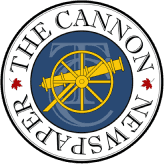Harry Khachatrian
Cannon Contributor
As the summer draws to its inevitable close, you look back in reproach, at the end of your halcyon high school days. You are officially a first-year engineering student. And, if you are anything like me, you are inundated with both excitement and apprehension. For those of you who have been admonished of the difficulties of engineering, I hope to quell those fears with some suggestions I wish I had when I was in first-year.
Forgot High School Calculus? Don’t Sweat It
There is always a coterie of Frosh students flushed with anxiety at the thought of walking into first-year math with the “everything-I-learned-inhigh-school” part of their brains scrubbed spotless like a Dexter crime scene. If this sounds like you, you might even be thinking, “Who needs Frosh week? I better spend this week pouring over old calculus textbooks, and maybe even read ahead.” Stop right there. Your first year professors are not expecting you to remember every nuanced vagary of twelfth-grade math. On the contrary, they assume you spent your summer like any 18-yearold who just graduated from high school and forgot everything. They teach you exactly what you need to know (and how to do it) from scratch, which brings us to the second point.
Don’t Fall Behind
Warren Buffet has two rules when it comes to investing. The first is never lose money, and the second is never forget rule one. In engineering, the rule to follow is, do not fall behind. You can extrapolate number two. Just because your professor starts the semester in first gear, do not be fooled into thinking you will be coasting into final exams. If you think the class is moving too slowly, miss lectures at your own risk – speaking from experience, skipping lectures by telling yourself you already know everything is a sure way to place yourself in academic peril. Sure, today you are sleeping through an introduction to limits, but within a week the chalkboards look like the set-pieces from Good Will Hunting.
Be Resourceful!
Most students, at one point or another, in pursuit of their iron ring will wallow in frustration, and angst, thinking “How on earth am I going to pass this?”. Not to worry! At UofT (and, university more broadly) there are a plethora of resources made available to you. Here are some I’ve found most useful.
Professor’s office hours: The one thing all your first lectures will have in common is the fact that the professor will start by writing down his or her office location and hours of availability. Despite what you might be thinking, it’s not just to decorate the chalkboard. It is for you. If something is not clear in a subsequent lecture, in your problem sets, etc. do not hesitate to drop by and ask the professor (just be sure to attempt understanding it yourself first). That $17,000 check you wrote the university for your tuition pays your professor’s salary. So make them work for it; there’s no reason not to.
TAs: Whatever the course, the TAs, or teaching assistants, will most likely be graduate students who have taken it before. This means they have marked assignments, exams, and seen where students tend to struggle and helped them overcome hardships. They are an invaluable resource that your tuition also goes towards. Your TAs are engineering veterans – they are like Tom Hanks in Saving Private Ryan. And you are Ryan. So, ask questions and let them save you.
courses.skule.ca: You may or may not have heard about it yet, but aside from Quercus, formerly Blackboard, (and Stack Overflow for you ECEs) the most useful website during your time here is courses.skule.ca. This website contains past years’ final exams and midterms – many of which contain solutions – for nearly every course you will be taking in your undergrad. It is a vital resource, not just in studying for exams, but also gauging the course itself as it progresses. How do you know which lectures are most important? Which topics to pay more attention to? You can find out all this by simply glancing over old midterms and exams for the course. Based on the types of questions your professor tends to ask, you should have a much better assessment of how you are doing in the course even before the midterm approaches.
Make Friends, They’ll Motivate You to Study
You are entering a program with hundreds of classmates where you know maybe a handful of people (or none!). But fear not, making friends at SkuleTM is literally the easiest thing you will do here. Frosh week is a great opportunity to get to know your future peers. So, be sure to socialize. The person sitting next to you in orientation may be the person you will be asking for help with a problem set in a few weeks. Before you go to the professor’s office hour, before emailing the TA, the first best way to tackle a challenge is sitting down in one of the many large libraries on campus with a study group.
The key takeaway is you should not worry. Sure, engineering is a challenging program, but you probably did not come here because it was going to be easy. You wanted a challenge — and a job, upon graduation. But before all that, put your worries aside and enjoy Frosh week! You are now part of a community of purple dyed students that can chant gleeful engineering cheers. And in these paeans to pilsner (for those of you with early birthdays) commence the next chapter of your academic lives.

